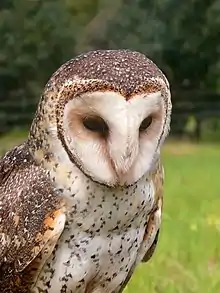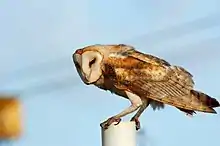Tytonidae
Barn-owls (family Tytonidae) are one of the two families of owls. The other is the true owls, Strigidae. They are medium to large sized owls with large heads and heart-shaped faces. They have long, strong legs with powerful talons.
| Barn-owls | |
|---|---|
 | |
| Australian Masked Owl, Tyto novaehollandiae | |
| Scientific classification | |
| Kingdom: | |
| Phylum: | |
| Class: | |
| Order: | |
| Family: | Tytonidae Ridgway, 1914 |
| Genera | |
|
Tyto | |
| Synonyms | |
|
Tytoninae sensu Sibley & Ahlquist | |
The barn owls are a wide ranging family. They are not found in northern North America, Saharan Africa and large areas of Asia. They live in a wide range of habitats from deserts to forests, and from temperate latitudes to the tropics.
The barn-owls' main characteristic is the heart-shaped facial disc, formed by stiff feathers. The feathers help to amplify and locate the source of sounds when the bird hunts. Adaptations to the wing feathers eliminate sound caused by flying. This helps both the owl's hearing, and keeps the prey unaware of the owl. To summarise: the owl hunts mainly at dusk and night-time. Its uses sound to detect prey movement: its hearing is sensitive, and its wings are almost silent.
Species
Genus Tyto
- Greater sooty-owl, T. tenebricosa
- Lesser sooty-owl, T. multipunctata
- Australian masked owl, T. novaehollandiae
- Cave-nesting masked owl, T. novaehollandiae troughtoni - disputed; probably extinct (1960s)
- Golden masked owl, T. aurantia
- Lesser masked owl, T. sororcula
- Buru masked owl, T. (sororcula) cayelii - possibly extinct (mid-20th century?)
- Manus masked owl, T. manusi
- Taliabu masked owl, T. nigrobrunnea
- Minahassa masked owl, T. inexspectata
- Sulawesi owl, T. rosenbergii
- Peleng masked owl, T. rosenbergii pelengensis - probably extinct (mid-20th century)
- Common barn owl, T. alba
- Eastern barn Owl, T. (alba) delicatula
- Ashy-faced owl, T. glaucops
- Red owl T. soumagnei
- African grass owl T. capensis
- Australasian grass owl T. longimembris
Genus Phodilus
- Oriental bay owl P. badius
- Samar bay owl P. (badius) riverae
- Congo bay owl, P. prigoginei - sometimes placed in Tyto
Fossil genera. The fossil record of the barn-owls goes back to the Eocene.
- Nocturnavis (Late Eocene/Early Oligocene) - includes "Bubo" incertus
- Necrobyas (Late Eocene/Early Oligocene - Late Miocene) - includes "Bubo" arvernensis and Paratyto
- Selenornis (Late Eocene/Early Oligocene of Quercy, France) - includes "Asio" henrici
- Prosybris (Late Eocene/Early Oligocene of Quercy? Early Miocene of France)
References
- Bruce M.D. 1999. Family Tytonidae (Barn-owls). In: del Hoyo J.; Elliott A. & Sargatal J. (eds): Handbook of birds of the world, Volume 5: Barn-owls to Hummingbirds: 34-75, plates 1-3. Lynx Edicions, Barcelona. ISBN 84-87334-25-3
- Steadman, David William 2006. Extinction and biogeography of tropical Pacific island birds. University of Chicago Press. ISBN 0-226-77142-3.
